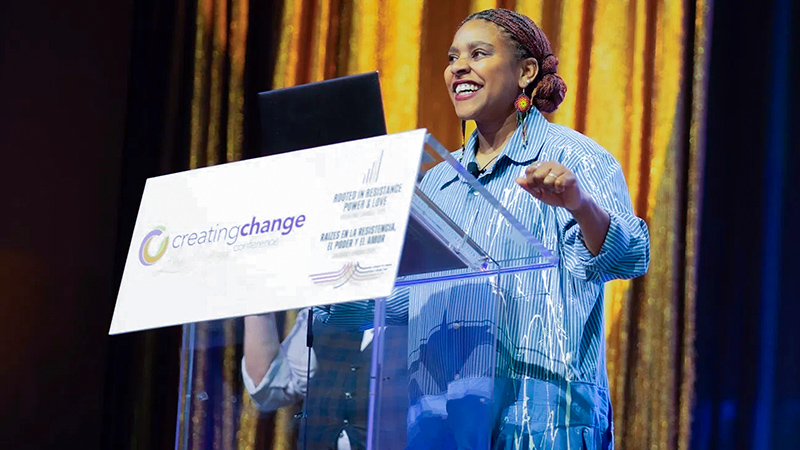House GOP Adds Anti-LGBTQ Amendments to Defense Bill
Republican amendments target Pride flags, transgender visibility, and military health care coverage.

LGBTQ advocates are condemning a series of six amendments tacked on to the Fiscal Year 2026 National Defense Authorization Act, a bill that funds the U.S. Department of Defense and other defense-related agencies.
The amendments, which target LGBTQ visibility and transgender health care in particular, were passed on largely party-line votes in the House of Representatives, causing Democrats to cry foul.
U.S. Rep. Mark Takano, chair of the Congressional Equality Caucus, accused Republicans of sacrificing bipartisan support for the NDAA by politicizing the process to curry favor with President Donald Trump and socially conservative voters. He warned that, if enacted, the amendments would harm transgender service members, cadets, and dependents of military personnel.
“Congress should be fighting for those who fight for us — but it’s clear the GOP has other priorities,” he said.
The first amendment, introduced by U.S. Rep. Ralph Norman (R-S.C.) and approved by roll call vote, prohibits children of service members enrolled in the Exceptional Family Member Program from accessing or being referred for gender-affirming treatments. It also bars reassigning service members to a different duty station to ensure their dependents can obtain treatments such as puberty blockers, hormones, or surgeries.
Four vulnerable Democrats from Republican-leaning or swing districts — Reps. Henry Cuellar (Texas), Vicente Gonzalez (Texas), Don Davis (N.C.), and Adam Gray (Calif.) — voted for the rider. Only one Republican, Del. Kimberlyn King-Hinds of the Northern Mariana Islands, voted against it.
Four amendments came from Rep. Nancy Mace (R-S.C.), who has positioned herself as a leading critic of transgender rights in Congress, arguing that she is defending women’s rights and children from policies she claims put them at risk.
One of Mace’s amendments bans all transition-related health care for transgender service members — even if considered “medically necessary” — as well as for dependents. It would bar TRICARE, the military’s main insurance program, from covering puberty blockers, hormone therapy, or surgeries for adults. It would also expand the existing prohibition on TRICARE coverage for dependents under 18 to include mental health services for youth with gender dysphoria.
Six Democrats — Cuellar, Gonzalez, Davis, Gray, Shomari Figures (Ala.), and Cleo Fields (La.) — voted for the ban on transition-related and mental health care. Two Republicans, King-Hinds and Rep. David Joyce (Ohio), opposed it.
Mace’s other amendments include banning transgender athletes at U.S. service academies from competing in female athletic programs; prohibiting the Pentagon from collecting data on service members’ gender identity in any form or survey; and blocking transgender individuals from using single-sex facilities on military bases not designated for their sex, defined by “reproductive system.”
All Republicans backed the transgender sports ban, while King-Hinds opposed both the data collection and facilities bans.
Ten Democrats — including Laura Gillen, John Mannion, and Tom Suozzi of New York; Jared Golden of Maine; Susie Lee of Nevada; and Kim Schrier and Marie Gluesenkamp Perez, both of Washington — supported the sports ban. Four Democrats — Cuellar, Davis, Gonzalez, and Gray — backed the data collection ban, while three voted for the facilities ban.
The final amendment, from Rep. Cory Mills (R-Fla.), bans Pride flags from being flown at Department of Defense facilities. It removes a 2024 NDAA provision that let military leaders approve certain flags — a policy critics said still allowed Pride flags to be displayed.
Five Democrats — Cuellar, Davis, Gillen, Golden, and Perez — supported the flag ban. Two Republicans, Del. Jim Moylan of American Samoa and Rep. Mike Lawler of New York, opposed it.
Luke Schleusener, CEO of Out in National Security, a nonpartisan group advocating for queer national security professionals, condemned the NDAA in its current form.
He called it “rife with cruel, bigoted amendments that undermine that common defense” and “an insult to the responsibilities of Congress and the traditions of the House Armed Services Committee.”
According to Schleusener, the current version of the NDAA “does not make America safer, or the Armed Forces stronger or more capable in a complex and dangerous world. If passed into law, this will harm recruitment, retention, and readiness across the uniformed services and the DOD civilian workforce. It dishonors the past and present service and sacrifice of thousands of Americans — and their children.”
Stay with Metro Weekly for ongoing coverage of LGBTQ rights in Congress and beyond. Subscribe to our free newsletter for the latest updates on legislation, politics, and community news.
Support Metro Weekly’s Journalism
These are challenging times for news organizations. And yet it’s crucial we stay active and provide vital resources and information to both our local readers and the world. So won’t you please take a moment and consider supporting Metro Weekly with a membership? For as little as $5 a month, you can help ensure Metro Weekly magazine and MetroWeekly.com remain free, viable resources as we provide the best, most diverse, culturally-resonant LGBTQ coverage in both the D.C. region and around the world. Memberships come with exclusive perks and discounts, your own personal digital delivery of each week’s magazine (and an archive), access to our Member's Lounge when it launches this fall, and exclusive members-only items like Metro Weekly Membership Mugs and Tote Bags! Check out all our membership levels here and please join us today!




























You must be logged in to post a comment.